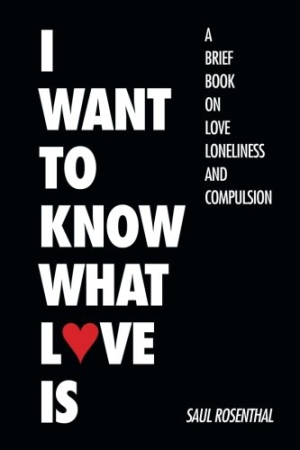I Want to Know What Love Is
A Brief Book on Love, Loneliness, and Compulsion
Blending genres to create a very personal narrative, I Want to Know What Love Is is a brief look at a compelling life.
I Want to Know What Love Is: A Brief Book on Love, Loneliness, and Compulsion by Saul Rosenthal is a memoir shaped by heavy doses of obsession and unhappiness.
Opening with a refutation of the Robert Penn Warren quote, “Love does not exist…but the dream of it does,” Rosenthal spends much of the book trying to establish the argument that while love is a saving grace, it can also bring much misery. The multifaceted concept of love is examined in its many forms, from love of God to romantic love and everything in between. The exploration of these different types of love serves to establish how, though it’s great when requited, the feeling can drive people to extreme forms of escapism—such as drinking, drugs, or in Rosenthal’s case, gambling.
Interspersed with quotes from favorite authors like T. S. Eliot and Tennessee Williams, the text attempts to link together Rosenthal’s great interest in women, his subsequent spurned desire, and his cataclysmic experience with gambling addiction. From a failed marriage early in life to a string of teaching jobs taken just to make enough money to bet, the book devotes a great amount of space to describing the dangers of the compulsion: “I started gambling to escape my addiction to past failures and then became addicted to the failures of gambling.” The book also features something of a brief self-help section in which Rosenthal praises the work of Dr. Leo Buscaglia, known as “Dr. Love.”
Rosenthal struggles to make coherent, meaningful connections between the many subjects broached. He often falls back on clichés and long quotes from other sources in order to establish meaning. This approach reads as self-indulgent and could easily be removed without damaging the book’s intent.
Though the text is fragmented, Rosenthal has lived an interesting, storied life, and some of his language reflects that. Parts are well-crafted and successfully evoke what it is like to lose everything. His meditations on loneliness in relation to his own experience are also apt, eliciting introspection about the subject. The back cover blurb states that “redemption comes, but comes slow and hard,” which is an appropriate summary of Rosenthal’s life. The book could have, however, delved more into the redemption, or, specifically, how he got to that place after giving up gambling.
Blending genres to create a very personal narrative, I Want to Know What Love Is is a brief look at a compelling life.
Reviewed by
Amanda Adams
Disclosure: This article is not an endorsement, but a review. The publisher of this book provided free copies of the book and paid a small fee to have their book reviewed by a professional reviewer. Foreword Reviews and Clarion Reviews make no guarantee that the publisher will receive a positive review. Foreword Magazine, Inc. is disclosing this in accordance with the Federal Trade Commission’s 16 CFR, Part 255.

